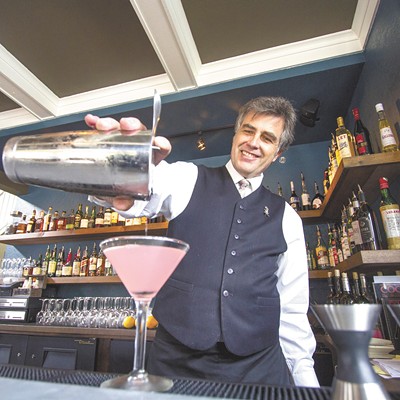Cast aside your assumptions about farmers making moonshine. Mute, for the moment, your mental banjo. Tim Danaher, a Palouse farmer who for six months has been making whiskey with Dry Fly Distilling, says it’s a logical profession.
“Distilling in this country — and even in Scotland and Ireland — was a farmer’s business,” he says over a patchy cell phone connection from somewhere amid the 1,900 acres of wheat, barley and garbanzo beans he tends in the Colfax area. “If you had a good crop and you could feed your family and your livestock, the logical thing was to distill [the rest], because you didn’t have any place to leave the grain, and you could reduce it to alcohol much easier than carrying it to market to sell.”
Danaher, 59, was the first — and, so far, possibly the only — Washington citizen to avail himself of a recent state law that not only upped the amount that distilleries like Dry Fly can produce per year (from 20,000 gallons to 60,000) but which also allowed them to contract out their services to wannabe distillers.
Growing up in St. John, Wash., Danaher made wine as a teenager. Some friends once built a still to squeeze out “some pretty crude corn whiskey” — “I’m amazed we didn’t get sick,” he says — but going into his week-long class with Dry Fly in 2009, he admits he didn’t really know what he was doing.
So he took the course. And then hit the books.
“I’ve always been a fan of Irish whiskey, because it’s very smooth. Of course, the distillers don’t let out what their mash bill [recipe] is, but I’d read extensively on the industry and found a book that was a history of the Irish distilling industry that went back two or three hundred years,” he says. “I found a report from a tax agent from 1873, listing what was in a batch of the old-style Irish whiskey. From that, we tweaked it, and that is basically my mash bill.”
This spring, along with Dry Fly’s Kent Fleischmann and Don Poffenroth (shortly before Gov. Chris Gregoire signed the new booze bill into law in April), Danaher spent a full day running the mash, grinding the grain, shipping it to the mash tun and later into a fermenter. A week later, he returned for another long day, pumping the liquid into two different stills and finishing it. Later in the spring, on cold, unfarmable days when he had nothing else to do, he’d drive up to Spokane just to hang out and help Dry Fly with whatever they working on.
“Tim’s a great guy, and he’s clearly passionate about distilling and good whiskey,” says Patrick Donovan, another distiller at Dry Fly. “He wants to know how it works. He likes to get hands-on — spray the hoses out and clean and transfer from tank to tank. He’s really engaged.”
The bride of this engagement is what Danaher’s calling “Hibernian” whiskey (because he can’t legally call it “Irish” whiskey), but it won’t be ready to drink until it’s sat in barrels for three years. And even then, you never know.
“You’re rolling the dice,” he says of the final product. “I went over and over with it with Dry Fly, getting their ideas, what they thought. You have to take that leap of faith.”
Danaher’s already poised for another leap, though. Having so far produced about 115 gallons of the Irish-style whiskey, he’s heading back to Dry Fly this month to make more of the same, plus some Scotch-style booze he’ll call “Caledonian” whiskey (for what the Romans called Scotland: Caledonia, “the hard rocky place”).
Once he’s finished with both (and obtained his federal distiller’s license), he’ll bottle his O’Danagher’s Whitmancounty-grown Hibernian and Caledonian whiskeys and pour a glass or two for the Washington Liquor Control Board, which will decide if they’ll purchase it for sale in state liquor stores (assuming such stores will still exist after next month’s election).
In the meantime, he’ll keep farming.
“[Distilling] is a side business for me, so I don’t have to put the whiskey out too early to get the cash flow,” he says, reflecting. “Farmer-distiller used to be a valid title. I’m trying [to reclaim that]. One bushel at a time.”




















